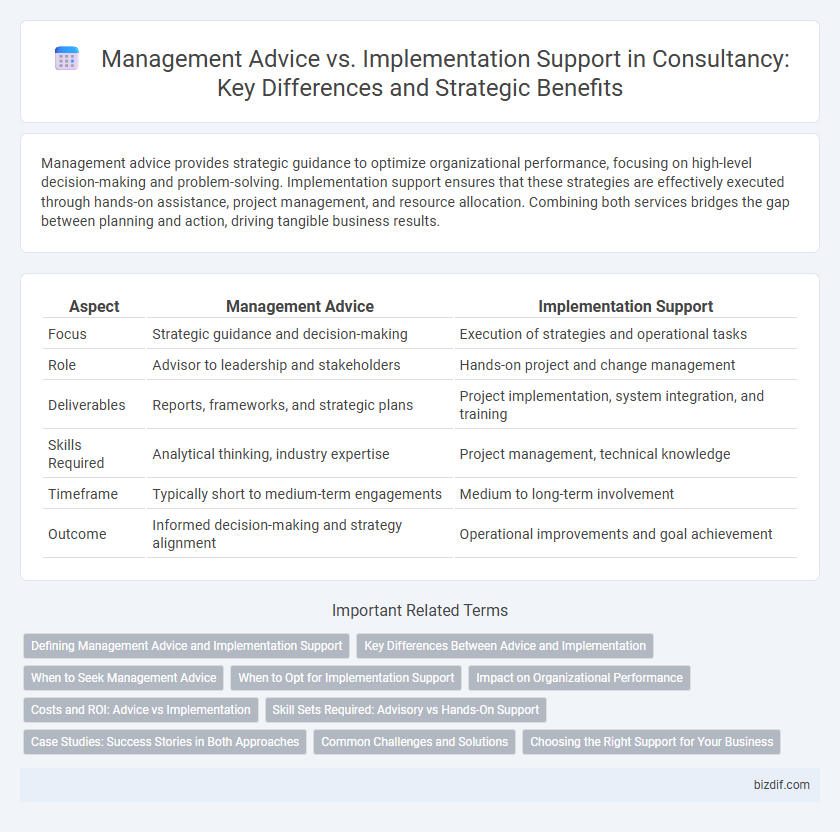Management advice provides strategic guidance to optimize organizational performance, focusing on high-level decision-making and problem-solving. Implementation support ensures that these strategies are effectively executed through hands-on assistance, project management, and resource allocation. Combining both services bridges the gap between planning and action, driving tangible business results.
Table of Comparison
| Aspect | Management Advice | Implementation Support |
|---|---|---|
| Focus | Strategic guidance and decision-making | Execution of strategies and operational tasks |
| Role | Advisor to leadership and stakeholders | Hands-on project and change management |
| Deliverables | Reports, frameworks, and strategic plans | Project implementation, system integration, and training |
| Skills Required | Analytical thinking, industry expertise | Project management, technical knowledge |
| Timeframe | Typically short to medium-term engagements | Medium to long-term involvement |
| Outcome | Informed decision-making and strategy alignment | Operational improvements and goal achievement |
Defining Management Advice and Implementation Support
Management advice involves providing strategic guidance, expert analysis, and tailored recommendations to optimize business operations and decision-making processes. Implementation support focuses on executing these strategies by managing resources, driving change initiatives, and ensuring adherence to best practices for effective transformation. Combining both services enhances organizational performance by aligning strategic insight with practical application.
Key Differences Between Advice and Implementation
Management advice primarily involves strategic guidance, expert recommendations, and decision-making frameworks tailored to improve organizational efficiency and effectiveness. Implementation support focuses on executing strategies, facilitating change management, and ensuring that advised initiatives are operationalized through hands-on involvement and resource coordination. Key differences include the advisory role's emphasis on planning and analysis versus the implementation role's concentration on action, delivery, and monitoring results.
When to Seek Management Advice
Seek management advice when strategic decision-making, organizational restructuring, or leadership challenges arise that require expert insights to align business goals with operational capabilities. Early consultation helps identify risks, optimize resource allocation, and develop actionable plans before full-scale implementation begins. Engaging consultants at this stage ensures informed, data-driven strategies that enhance long-term performance and competitive advantage.
When to Opt for Implementation Support
Implementation support is essential when organizations face complex changes requiring hands-on assistance to ensure successful execution of strategies. It is particularly beneficial in projects with tight timelines, high risk, or where internal resources lack specific expertise for operationalizing management advice. Choosing implementation support bridges the gap between planning and action, fostering accountability and measurable outcomes.
Impact on Organizational Performance
Management advice provides strategic insights that enhance decision-making and long-term planning, directly influencing organizational goals and competitive positioning. Implementation support ensures these strategies are effectively executed, translating plans into measurable improvements in operational efficiency and employee productivity. Combining both approaches maximizes impact on organizational performance by aligning vision with actionable results and sustainable growth.
Costs and ROI: Advice vs Implementation
Management advice typically incurs lower upfront costs but may result in variable ROI due to reliance on client execution capabilities. Implementation support often demands higher initial investment but enhances ROI by ensuring effective application and faster realization of benefits. Evaluating the balance between advisory fees and the potential for improved operational outcomes is crucial for optimizing total cost efficiency and maximizing returns.
Skill Sets Required: Advisory vs Hands-On Support
Management advice demands strategic thinking, analytical skills, and deep industry knowledge to guide decision-making processes effectively. Implementation support requires hands-on expertise, project management capabilities, and technical proficiency to execute plans and ensure operational success. Distinct skill sets differentiate advisory roles, centered on insight and foresight, from implementation roles that emphasize practical application and problem-solving.
Case Studies: Success Stories in Both Approaches
Case studies reveal that management advice drives strategic transformations by identifying core issues and recommending tailored solutions, while implementation support ensures these strategies are executed effectively on the ground. Companies leveraging management advice report improved decision-making frameworks and operational efficiencies, whereas those utilizing implementation support experience accelerated adoption and measurable performance gains. Success stories from global firms demonstrate that integrating both approaches yields a comprehensive impact, combining high-level strategy with practical execution excellence.
Common Challenges and Solutions
Management advice often faces challenges such as misalignment with organizational culture and resistance to change, which can delay strategic adoption. Implementation support addresses these issues by providing hands-on assistance, tailored training, and continuous feedback loops to ensure practical integration and measurable outcomes. Combining clear communication and stakeholder engagement minimizes risks and accelerates sustainable transformation in consulting projects.
Choosing the Right Support for Your Business
Choosing the right support for your business hinges on understanding the distinct roles of management advice and implementation support. Management advice provides strategic insights and expert recommendations to optimize decision-making, while implementation support ensures those strategies are executed effectively through hands-on guidance and resource allocation. Aligning your choice with your company's current capacity and goal clarity maximizes operational efficiency and drives sustainable growth.
Management advice vs Implementation support Infographic

 bizdif.com
bizdif.com